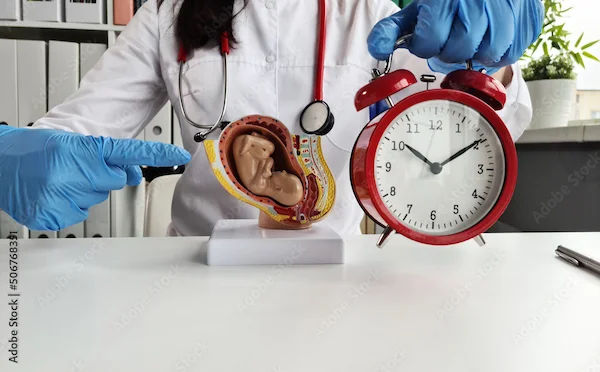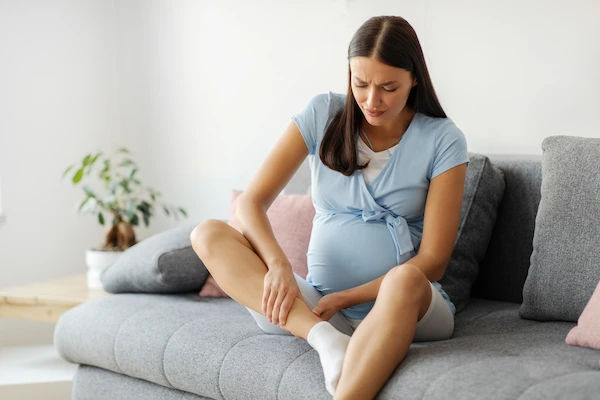Pregnancy Bloating: Causes and How to Find Relief
Know about pregnancy bloating, what it is, dietary influences, top prevention tips and more


Introduction
The journey of pregnancy is filled with incredible milestones, but it also comes with a host of less-glamorous side effects. Among the most common and earliest signs is the uncomfortable, often persistent, sensation of bloating. That feeling of being overly full, tight, and swollen in the abdomen can start surprisingly early and last throughout the nine months. This article will demystify the causes of pregnancy bloating, distinguish it from other concerns, and provide you with a practical toolkit of prevention tips and relief strategies to help you feel more comfortable and enjoy this special time.
Understanding the "Why": The Root Causes of Bloating in Pregnancy
Bloating during pregnancy isn't caused by just one thing; it's a perfect storm of hormonal shifts and physical changes. Understanding these mechanisms is the first step toward managing them effectively.
The Hormonal Culprit: Progesterone's Role
The primary driver of early pregnancy bloating is the hormone *progesterone. Levels of this essential hormone skyrocket after conception to support the uterine lining and maintain the pregnancy. However, progesterone is a smooth muscle relaxant. This means it slows down the entire digestive tract, a process known as reduced gastrointestinal motility.
How it works: When digestion slows, food travels more slowly through your intestines. This allows more time for your body to absorb water and nutrients, which is beneficial for the baby. The downside is that it also allows more time for gas to be produced by gut bacteria fermenting the food, leading to a buildup of gas and a feeling of bloating, fullness, and constipation.
Consult a Gynaecologist for Personalised Advice
The Physical Factor: Your Growing Uterus
As your pregnancy progresses into the second and third trimesters, a new factor emerges: your expanding uterus. This incredible organ grows from the size of a pear to that of a watermelon, occupying increasingly more space in your abdominal cavity.
The Squeeze Effect: The growing uterus puts direct pressure on your stomach and intestines. This compression can further slow digestion, trap gas, and make you feel full and bloated after even small meals. It can also contribute to heartburn and acid reflux by pushing stomach acids upward.
Dietary and Lifestyle Influences
While hormones and physical changes are the main actors, your daily habits play a significant supporting role. Certain foods known to produce gas can exacerbate the natural bloating caused by pregnancy. How and when you eat can also make a big difference.
Early Sign or Something Else? Bloating vs. Baby Bump
Many women experience bloating as one of the first signs of pregnancy, often before they even miss a period. It's crucial to distinguish this early bloating from the start of a true baby bump.
- Early Pregnancy Bloating: This is caused by hormones and a digestive slowdown. It tends to come and go, often feeling worse later in the day or after a meal. It can be relieved by passing gas or having a bowel movement.
- The Baby Bump: A true baby bump caused by the growing uterus is typically firmer and more consistent. It usually becomes noticeable between weeks 12 and 16 for first-time mothers (often earlier for second pregnancies) and grows steadily from there.
Key Takeaway: If your "bump" is soft, fluctuates in size, and is accompanied by gas, it's likely bloating. If it's hard, round, and consistently growing, it's your baby!
Top Prevention Tips to Combat Pregnancy Bloating
You can't stop your body from producing progesterone, but you can take proactive steps to minimise its bloating effects.
1. Master the Art of Eating Smaller, More Frequent Meals
- Instead of three large meals that overwhelm your slowed digestive system, aim for five or six smaller meals throughout the day. This prevents your stomach from becoming too full and reduces pressure on your intestines, making digestion easier.
2. Slow Down and Chew Thoroughly
- Eating quickly causes you to swallow excess air, which gets trapped in your digestive tract and leads to gas. Make a conscious effort to eat slowly, chew your food completely, and avoid talking while eating. This simple practice aids digestion significantly.
3. Become a Hydration Expert
- It may seem counterintuitive, but drinking plenty of water is essential for preventing constipation, a major contributor to bloating. Aim for 8-10 glasses a day. However, avoid using a straw and limit chugging large amounts at once, as this can introduce extra air.
4. Identify and Limit Gas-Producing Foods
While everyone is different, common gas-causing foods include:
- Beans, lentils, and broccoli
- Cabbage, cauliflower, and Brussels sprouts
- Onions and garlic
- Fried or fatty foods
- Carbonated beverages (they add gas directly to your system)
- Artificial sweeteners (sorbitol, mannitol)
Try keeping a food diary to identify your personal triggers and limit them. Don't cut out healthy vegetables entirely; just eat them in smaller quantities.
5. Incorporate Safe, Gentle Exercise
- Physical activity is one of the best remedies for sluggish digestion. Pregnancy-safe exercises like walking, swimming, prenatal yoga, and stationary cycling can help stimulate your bowels and move trapped gas through your system.
6. Choose Your Fibre Wisely
- Fibre is crucial for preventing constipation, but you must increase your intake gradually and with plenty of water. Sudden large amounts can worsen bloating. Focus on high-fibre foods like oats, apples, pears, and chia seeds.
7. Consider a Probiotic
- Pregnancy-safe probiotics (always check with your doctor first) can help balance the good bacteria in your gut, potentially improving overall digestive health and reducing gas and bloating. Look for strains like Lactobacillus and Bifidobacterium.
When to Seek Help: Bloating and Serious Concerns
While bloating is usually normal, it's important to be aware of when it could signal a more serious issue. Contact your healthcare provider immediately if your bloating is accompanied by:
- Severe or persistent abdominal pain
- Painful cramping
- Blood in your stool
- Severe diarrhoea or constipation
- Significant swelling in your hands, feet, or face (could be a sign of preeclampsia)
Conclusion
Pregnancy bloating, while uncomfortable, is a common and typically harmless part of the journey to motherhood. It's your body's natural response to the powerful hormonal changes and physical adaptations required to grow a new life. Implementing strategic dietary changes, staying active, and listening to your body can make a profound difference in your comfort levels. Remember, this is a temporary phase. If you ever have doubts or experience severe symptoms, your healthcare provider is your best resource.
Consult a Gynaecologist for Personalised Advice
Consult a Gynaecologist for Personalised Advice

Dr. Ashish Kale
Obstetrician and Gynaecologist
19 Years • MBBS, MD (OBG), DNB, MNAMS, Diploma in Endopelvic Surgery, Fellowship in Embryology, Fellowship in ART.
Pune
Apollo Hospitals Pune, Pune

Dr. Asawari Kesari Kapoor
Obstetrician and Gynaecologist
23 Years • M.B.B.S, D.G.O(Mumbai) ,D.G.O (C.P.S), D.N.B (OBGY)
Delhi
Apollo Hospitals Indraprastha, Delhi
(25+ Patients)

Dr. Vineet Mishra
Infertility Specialist
36 Years • MD, Phd, DSc
Ahmedabad
Apollo Hospitals - Gandhinagar, Ahmedabad, Ahmedabad

Dr. Niti Vijay
Obstetrician and Gynaecologist
12 Years • MBBS, MD
New Delhi
THE CLINICS, New Delhi

Dr. Deepika Negi
Obstetrician and Gynaecologist
11 Years • MBBS,MS OBGYN
Greater Noida
SAMARPIT MEDICLINIC ORTHO and GYNAE CARE, Greater Noida
Consult a Gynaecologist for Personalised Advice

Dr. Ashish Kale
Obstetrician and Gynaecologist
19 Years • MBBS, MD (OBG), DNB, MNAMS, Diploma in Endopelvic Surgery, Fellowship in Embryology, Fellowship in ART.
Pune
Apollo Hospitals Pune, Pune

Dr. Asawari Kesari Kapoor
Obstetrician and Gynaecologist
23 Years • M.B.B.S, D.G.O(Mumbai) ,D.G.O (C.P.S), D.N.B (OBGY)
Delhi
Apollo Hospitals Indraprastha, Delhi
(25+ Patients)

Dr. Vineet Mishra
Infertility Specialist
36 Years • MD, Phd, DSc
Ahmedabad
Apollo Hospitals - Gandhinagar, Ahmedabad, Ahmedabad

Dr. Niti Vijay
Obstetrician and Gynaecologist
12 Years • MBBS, MD
New Delhi
THE CLINICS, New Delhi

Dr. Deepika Negi
Obstetrician and Gynaecologist
11 Years • MBBS,MS OBGYN
Greater Noida
SAMARPIT MEDICLINIC ORTHO and GYNAE CARE, Greater Noida
More articles from pregnancy
Frequently Asked Questions
How early in pregnancy does bloating start?
Bloating can be one of the very first signs of pregnancy, appearing as early as 1-2 weeks after conception (around weeks 3-4 of pregnancy), even before a missed period, due to the rapid rise in progesterone.
Can bloating be mistaken for a baby bump?
Yes, especially in early pregnancy. Early bloating is softer and can fluctuate throughout the day, while a true baby bump is firmer and grows consistently starting in the second trimester.
Are there any safe over-the-counter medications for pregnancy gas?
Simethicone (found in products like Gas-X) is generally considered safe during pregnancy as it works locally in the gut and isn't absorbed into the bloodstream. However, you should always consult your doctor before taking any medication while pregnant.
Does pregnancy bloating cause actual weight gain?
No, the feeling of bloating is primarily caused by gas and water retention, not fat gain. However, the overall healthy weight gain of pregnancy will naturally include your growing baby, placenta, increased blood volume, and other factors.
Why is my bloating worse at night?
Bloating often worsens as the day goes on because gas has had more time to build up in your digestive system from the food you've eaten throughout the day. Lying down can also make the sensation feel more pronounced.




